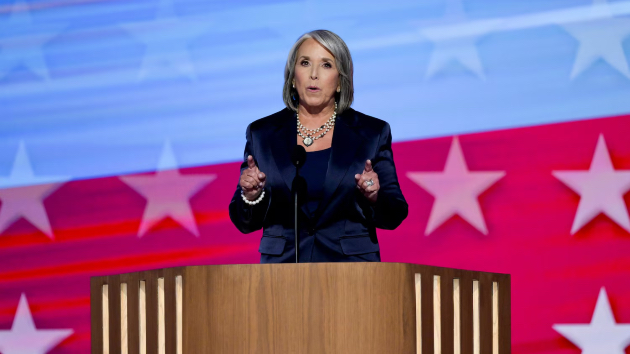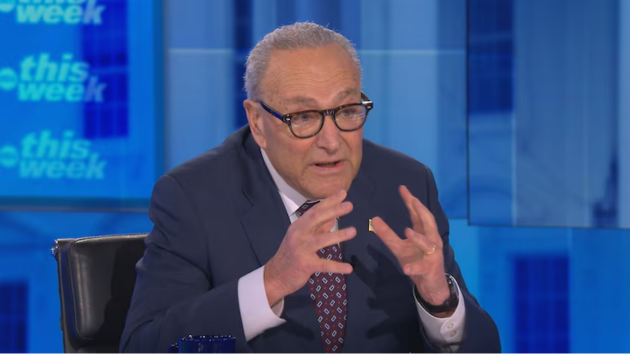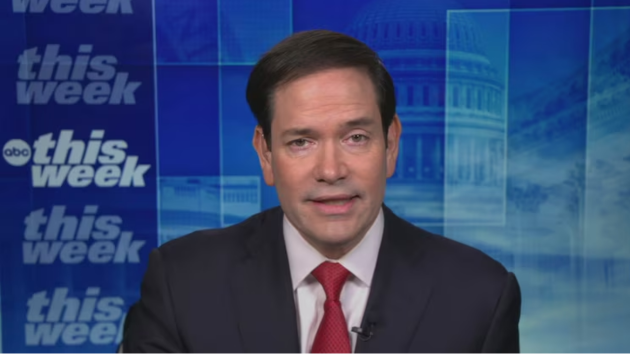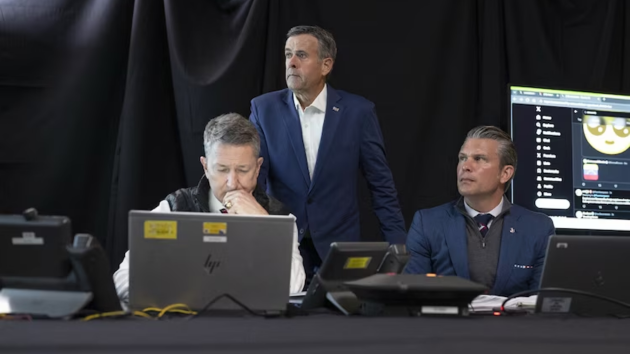Democratic governors discuss going on offense, playing defense against Trump
Written by ABC Audio All Rights Reserved on December 10, 2024

(WASHINGTON) — As Democratic governors prepare to navigate and resist parts of President-elect Donald Trump’s next administration, one told ABC News she is most alarmed by Trump’s tariff plan.
“Tariffs would be devastating to our economy, especially with the amount of trade we do with Canada,” Massachusetts Gov. Maura Healey told ABC News.
Trump has threatened to impose a 25% across the board tariff on Mexico and Canada, in addition to a 10% tariff on goods imported from China. These are the U.S.’s top three trading partners. Economists warn this would raise prices on everyday goods and wreak havoc on the economy.
“I’m a governor who’s come in, cut taxes, worked to lower housing costs, grow the economy. If he were to impose tariffs — it would first of all — I think it’s not smart to do — and it would be devastating to consumers,” Healey said, “Think about all the housing we’re trying to build here right now — what will that do to housing costs?”
In an interview with NBC News that aired on Sunday, Trump said he couldn’t guarantee that his tariff plan would not raise prices for American consumers.
Other Democratic governors, who gathered last weekend for the first time since the election for a winter meeting in Beverly Hills, California, said Trump’s tariff proposals were a chief concern among a number of others: threats to entitlements, his immigration proposals, and repeals of climate and reproductive protections. Several high-profile governors told ABC News they’re deep into preparations to use legislative, executive or legal actions to combat Trump’s moves.
At the Beverly Hilton over the weekend, the tight-knit group of Democratic talent — many of whom will be some of the strongest detractors of Trump’s policies and also some of the best-positioned to be at the top of the party’s presidential ticket in 2028 — gathered for private, closed-door meetings with one another, donors and other stakeholders. The group of about 18 governors and governors-elect, hosted by California Gov. Gavin Newsom, focused on how to navigate through Trump’s leadership, according to several who spoke with ABC News, rather than any significant post-election analysis following the Democrats’ losses last month.
The group of governors in Beverly Hills included many of the likely 2028 contenders, including blue state leaders like Newsom and Illinois Gov. JB Pritzker, who have been actively on offense against Republican leadership since Nov. 6, and red state ones like Democratic Governors Association Vice Chair and Chair-elect Kentucky Gov. Andy Beshear.
Healey, Michigan Gov. Gretchen Whitmer, North Carolina Gov. Roy Cooper, New York Gov. Kathy Hochul, and Minnesota Gov. Tim Walz were also on the guest list — many of whom have questions looming about their own political futures.
“I would expect that we’ll put up quite a fight to take the House back. And I think that we’ll have an incredible bench in the primary ’28,” New Mexico Gov. Michelle Lujan Grisham told ABC News about the plans of many of the governors.
Different tones in taking on Trump
The governors are striking different tones as they prepare for Trump’s presidency.
The strongest, most combative voices of course have been from leaders like Newsom, who initiated a recently convened a special legislative session in California to increase funding for its Department of Justice and other agencies so they’ll be able to quickly file litigation to challenge actions taken by a second Trump administration. Pritzker, too, has made not-so-veiled threats about how he’d approach the administration should it “come for” his people, and recently announced his position as co-chair, along with Jared Polis of Colorado, of a new nonpartisan coalition of governors committed to protecting the “state-level institutions of democracy” ahead of Trump’s presidency.
Other governors encouraged their peers to meet this moment offensively through their agendas.
“Democratic governors should approach this with strength and resolution and an activist agenda. Because this is the place where we can make progress too,” Washington Gov. Jay Inslee told ABC News.
“You can’t stop some 85% of the things I would like to do in that state, so I think the order of the day is defend where we can in fighting with an advance every day with our own ambitions and unaffected by him, so that shadow doesn’t fall in our state,” said Inslee, who is leaving his seat this winter to make way for incoming Gov. Bob Ferguson.
But a different group of governors are acting much more lukewarm in their approaches, emphasizing their desire to “work” with the Trump administration and some citing past collaborations with the president-elect’s team, like during the COVID-19 pandemic.
Beshear said last weekend that Democrats needed to lean into “reason” while Trump is in office and that he’s willing to work with the incoming administration.
“The middle ground, middle of the road, common ground, common sense, is open. It’s open,” Beshear told a group of reporters on Saturday.
Kansas Gov. Laura Kelly, the DGA’s chair, said this weekend that she wasn’t yet anticipating Trump or his agencies’ actions, but “We will always look for ways to work together” with the caveat that she’ll “draw the line” on things “that they push us to do that we think are wrong, illegal, anything like that.”
The varying approaches from governors to Trump’s agenda could be a coordinated strategy as the group wrestles with how best to support each other within a party attempting to rebuild — a complicated task as they also eye each other as potential presidential primary competition.
“We know how to create space to protect people and protect the priorities,” Lujan Grisham told ABC, noting that she and many other governors aren’t officially part of Pritzker and Polis’ new coalition, for example. “We did it on climate. We still do it on climate. We did it on reproductive premiums, we’re gonna have to still do it on reproductive premiums, and we’ll do some test cases in states that allow us to frame and direct these coalitions.”
“We want to be strategic about what it is that we are announcing. And here’s why: We’ve got a president-elect and a team that, before this and every day, said ‘We’re going to punish anyone in our way, and we’re going to particularly punish states,'” she went on. “And the difference in California versus New Mexico — California is definitely on the radar. I don’t minimize what the Trump administration can negatively do to my state, but we’re also very effective at watching and understanding what’s occurring, and then we can deploy our joint efforts pretty damn fast.”
Plans to fight Trump’s tariff, immigration proposals
While governors can mount legal fights against parts of Trump’s plan, the president can use executive power to impose sweeping tariffs.
But for immigration, on the other hand, governors can resist Trump’s proposals in clearer ways.
Border state Gov. Lujan Grisham told ABC News she’d block Trump’s ability to use detention centers, deploy the National Guard or even request data in her state if he attempted mass deportations.
“I take him at his word. He says he’s going to do, try to do mass deportations,” she said, adding that she wouldn’t be a partner in those moves: “There’s a lot that he can’t do by himself.” .”I mean, I’ve made it very clear over a number of years on this issue is that I will not use our National Guard to perform that kind of service,” Kelly told reporters.
“I will not send them to the border. We have had Guard members go to the border, but they have been federalized when they’ve been down there. I don’t see that as the role of the National Guard — they are there to serve Kansas, Kansas issues, so I don’t see that changing… The State Police are mine, and it’s not their job, either. So we will take the same approach as we have with the Guard,” Kelly added.
On immigration, most Democratic governors agree that violent criminals need to be deported, noting that it’s always been the case that local and state law enforcement work with federal authorities on investigating crimes. But where many governors draw the line is on deporting undocumented immigrants who have been living and working in America for a long time, arguing it’s inhumane and damages the economy.
“We don’t know what President Trump’s immigration plan is going to look like at the end of the day. He is a master of saying something, creating a great deal of noise, and then the reality may be different. So I’m going to wait to see exactly what it is he ultimately proposes,” incoming North Carolina Gov. Josh Stein told reporters about his plans to respond to Trump’s immigration moves.
“The people of North Carolina have every right to be safe in their communities, and anybody who commits a violent crime must be held accountable, fully, and that’s whether they’re in this country as American citizens or they’re here as undocumented people, and if they’re here undocumented, they should be deported,” Stein said.
They also question how Trump will execute his plan. Trump could direct the National Guard to help with transport and logistics, but one Democratic governor told ABC News these are precious resources, and they need their National Guard for emergencies like storms, fires and severe flooding.
Trump’s team has discussed in the past how to strip federal resources from Democratic-run cities if they refuse to work with the administration on deporting undocumented immigrants, according to sources familiar with the matter.
Blue state governors say they’re concerned about the Trump administration weaponizing federal funding and “picking winners and losers.” One governor told ABC News their state is focused on locking down every federal dollar the state is entitled to, and securing all of the funding made available through the Biden administration’s infrastructure law and CHIPS and Science Act.
In California, Newsom has also started to “Trump-proof” his budget, which is one of the aims of his move to convene the legislature last week.
Copyright © 2024, ABC Audio. All rights reserved.
 KVSP
KVSP 





